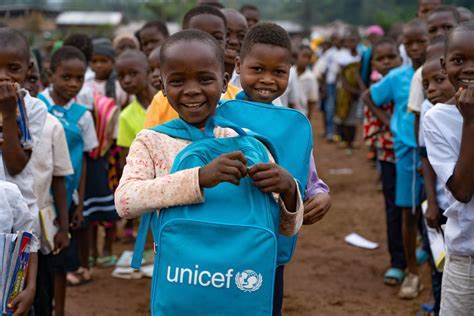
As Nigeria marked the 2025 Day of the African Child, the United Nations Children’s Fund (UNICEF) and key stakeholders renewed calls for stronger, strategic investment in child-focused services, urging all levels of government to turn commitments into concrete action.
Speaking at a Media Dialogue on Public Spending for Children’s Rights held in Lagos, Celine Lafoucriere, Chief of UNICEF’s Southwest Field Office, highlighted the persistent deprivation faced by millions of Nigerian children, despite decades of advocacy.
“Almost 50 years after the 1976 Soweto uprising that inspired this day, Nigerian children are still asking for a better chance at life,” Lafoucriere said.
She criticised the state of public spending, noting that while budget allocations for child welfare may be increasing, they often remain inadequate, inefficient, and poorly tracked. She called for improved accountability and urged journalists to play an active role in spotlighting the gap between allocations and actual outcomes.
“You are not bystanders. Let’s follow the money and ensure spending translates into real results for children,” she told the media.
UNICEF Urges Transparent Spending and Child Participation in Budgeting for Lasting Impact
UNICEF’s Social Policy Specialist, Muhammad Okorie, acknowledged progress in some areas but stressed that implementation remains a major challenge. He emphasised that budgeting alone is not enough if resources are not spent equitably and transparently.
“Until all rights of all children are fulfilled, we cannot rest. Governments must not only budget but also spend responsibly and track every Naira,” he said.
Okorie also advocated for involving children in the budgeting process, noting that children are capable of expressing their needs and should be part of policy planning.
Representing the Lagos State Government, Mr Orojimi Abiodun, Director of Budget at the Ministry of Economic Planning and Budget, affirmed the state’s commitment to child welfare. He outlined key investments in education, healthcare, nutrition, sports, and immunisation, aligned with the state’s THEMES development agenda.
“We believe taking care of children today ensures a better society tomorrow,” he said.
The dialogue ended with a united call for accountability, data-driven policy, and cross-sector collaboration, reinforcing the urgent need to prioritise children’s rights and well-being in public finance decisions.
Participants agreed that no child should be left behind and that real progress requires matching policies with purposeful spending that reaches the most vulnerable.
…by Ani Juliana.
It’s time to move from promises to progress for Nigeria’s children. Let’s demand transparency, equity, and impact in public spending. Join the conversation and explore how you can be part of the change at LouisaOlaniyi.com.ng. No child should be left behind.
Ani Juliana, is A 300l student of the University of Nigeria Nsukka,
With the passion for content writing and Copywriting.
